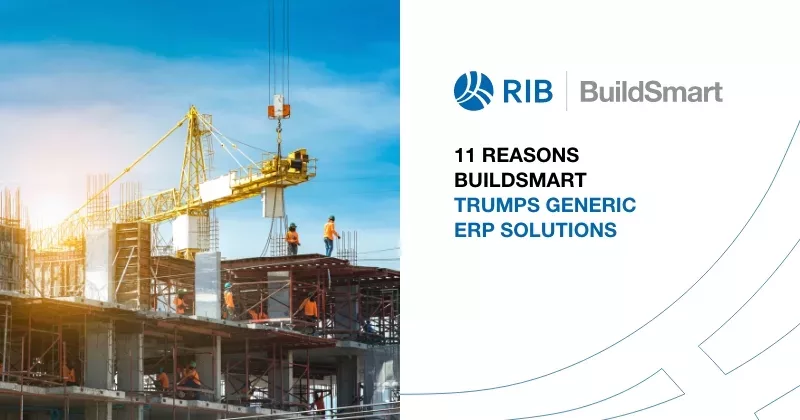21 mins read
How To Ensure Your Construction Budget Stays On Track With ERP Implementation

Construction projects are extremely complicated and have multiple elements that need to be effectively managed and delivered both in tandem and in sequence. Few, if any other industries face the same challenges on anything like the same scale. The development and enhancement of construction software now enables construction businesses to effectively track and manage more accurately all aspects employing modern technology. Keep reading to discover how to ensure your construction budget stays on track.
When all has been said and done, construction projects face two core challenges that must be met head on; Delivering on time and on budget.
Estimating
In today’s market, the first consideration a construction business will focus on is an effective and comprehensive estimating tool. That should come as no surprise considering the importance of completing a project on budget in the overall success of the construction business. Delivering on budget clearly impacts the margin and bottom line of the company so you should insist that the platform you consider is able to accurately deliver the right bid prices and integrated scheduling whilst having the capacity to integrate with a true Construction Enterprise Resource Planning (Construction ERP) tool.
Project Information Modeling
Modern construction projects are not only extremely complicated but will have multiple stakeholders and run for considerable amounts of time. Information and data pertaining to these projects mount up and should be available for comparison, review and consideration throughout the life of a project (and beyond). When considering your software partner, look into how this data can be shared and utilized across all departments and functions.
Over time, the data models and drawings associated with the project pile up. It’s important to have the ability to draw from this expanding repository of data at any point during the project lifecycle and find the insight you need. That’s where project information modeling comes in handy. Some vendors may also refer to this as “design data management.” Look for features that help you easily share models and business information between operations, finance, and leadership, with built-in analytics and reporting.
Cost Management and Accounting
Nearly every construction PM system will offer basic budgeting and benchmarking capabilities. However, a more robust cost management solution will include estimating and forecasting to give you an overall picture of each project’s financials. When you can effectively track and manage these details, you minimize the chance of surprises. This is also a must-have feature if your company handles accounting in-house. Excel spreadsheets are great for tracking costs and payroll, but it’s not always easy to access important data from the field or share up-to-date files with other key decision makers. Many construction PM tools include accounting capabilities that let you track budgets, payroll, invoicing, and billing so you can see your cash flow at a glance. Ideally, you’ll be able to select different forecast methods based on the type of item, using performance trends and goals stored in the same system.
Site Management
As job sites start to add up, it can be difficult for a project manager to oversee field work at every location. Look for software that offers site management and execution features to help create and communicate daily work plans, keep in touch with team members, and capture the results of the workday at the end of each shift. Some software can even help you stay compliant by managing inspection forms, and streamlining the process for equipment, safety, and quality inspections.
Actionable Data Analytics
Most construction PM tools will help you organise your workflow, keep track of client communications, and manage projects. But if you want the most bang for your buck, find a tool that will make it easy to review data in order to improve your processes. Some tools offer reporting features that will give you insight into your productivity and utilisation of assets. You may be able to monitor resources and measure earned value by tracking processes on a cost and schedule basis. This can help you increase productivity, improve performance, and enable strategic insight. If you have a labor shortage (a serious problem for most construction projects), you can spot it faster and take action immediately.
If you are searching for the best construction project management software, please evaluate all of the above points to ensure you get the best product for your needs.
See how Top construction companies benefit from RIB CCS Software – “RIB CCS Case Study – Capacit’e Infraprojects”
“ERP vs Construction ERP vs BIM“. Do you know the difference?
Most Recent
21 mins read
12 mins read
11 mins read
12 mins read

Ebook











